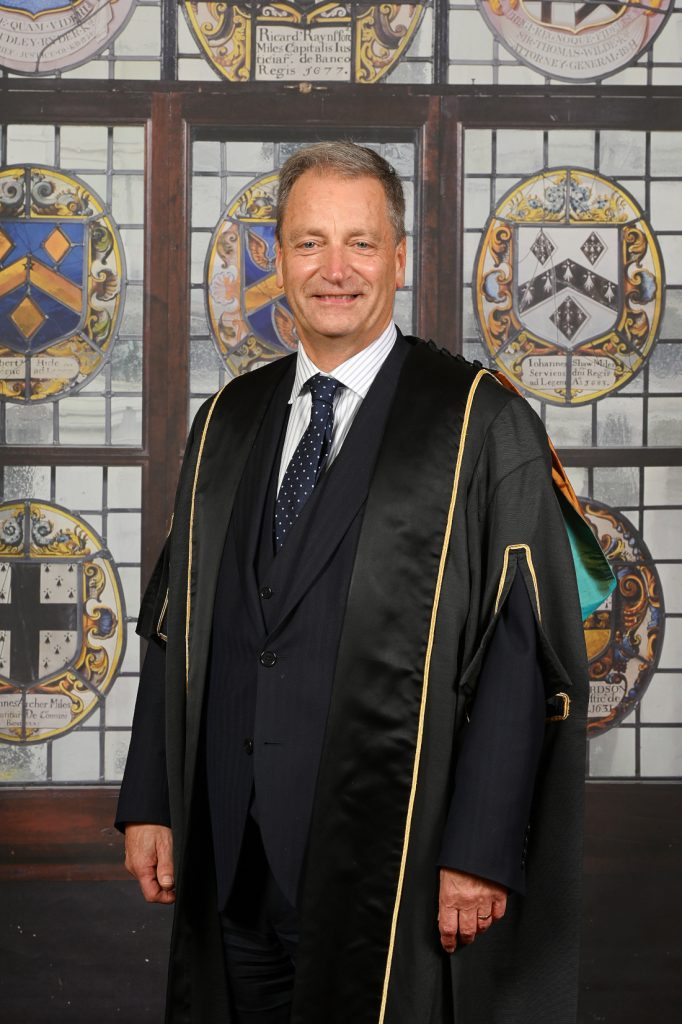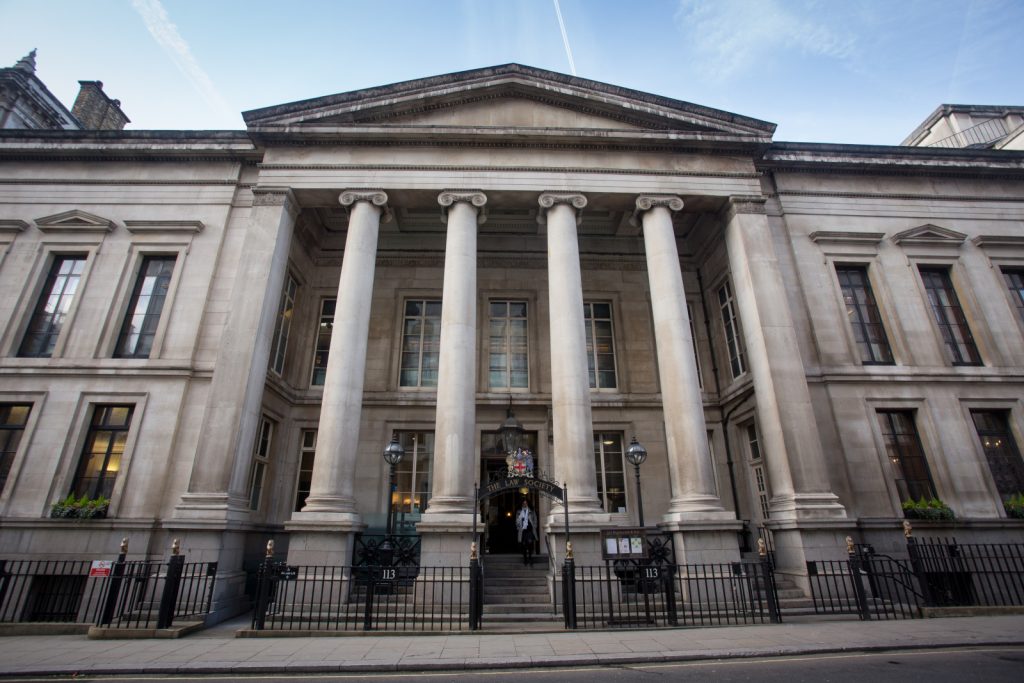Interview with Richard Atkinson, VP of the Law Society
Yasmin Traynor, member of the Lawbore Journalist Team, got the chance to interview Richard Atkinson, Vice-President of the Law Society, recently. She was keen to find out more about his area of practice (criminal law), what led him to become a solicitor, and what his priorities are for when he becomes President later this year…

I had the privilege of interviewing Mr Richard Atkinson, a distinguished solicitor, who qualified in 1990, and who specialises in criminal law.
Currently serving as the Vice President of the Law Society, he is set to become the Society’s 180th President in October 2024. In addition to his duties at the Law Society, he is a Senior Partner in the firm Tuckers Solicitors LLP. Richard was generous with his time, allowing me to quiz him on what inspired and continues to inspire him, to gain his advice for aspiring lawyers and his thoughts on the legal landscape more broadly.
Why the law?
I first wanted to understand the driving force behind Richard’s choice to pursue a legal career; wondering whether it was a lifelong passion or rooted in a particular catalyst. He shared that his decision was cemented around the age of 15 when he first encountered the book “The Best We Can Do: An Account Of The Trial Of John Bodkin Adams” by Sybille Bedford, published in 1958 (now sadly out of print). Richard admired the skills of the advocates and told me:
“…the way that the trial unfolded captivated me, and I knew that’s what I wanted to do”.
Intrigued by his response, I decided to read the book after the interview. The way Richard described how compelling the back-and-forth between the prosecution and defence was within the book was accurate; I was gripped! It wasn’t hard to understand why he found this depiction of the law inspiring.
Becoming a solicitor…
I was also curious as to why he decided to become a solicitor rather than a barrister, or even an academic. Richard conveyed a profound appreciation for academics, acknowledging their valuable contributions, and how they inform his work. However, he emphasised that what truly excites him is the process of “solving real-life problems.” The daily interaction with individuals facing tangible challenges is what he finds particularly invigorating and rewarding.
As a solicitor, Richard highlighted the unique aspect of being involved right from the inception of a case. In contrast to barristers, who primarily focus on advocacy after solicitors have laid the groundwork, solicitors maintain continuous engagement throughout the entirety of a case. The personal contact with clients, spanning from the initial stages to the case’s conclusion, is a facet he finds especially rewarding in his role.

His specialisation in criminal law comes from finding this particular niche to be both demanding and challenging, but also incredibly fulfilling. He notes it is not difficult to stay interested when there is such a variety of cases in the field. He gave an example of how rewarding his job can be when he detailed how a previous client had recently sent him an email which was entitled “Thank You 20 Years Too Late”. The client had been involved in problems early on in life but thanked Richard for rushing to the police station and being someone that they could rely on and trust. Richard said that this had him “floating around his room” when he received the email, and this reinforced his conviction that this human experience is specifically what keeps him vested and devoted to the field of criminal law.
Advocacy as a solicitor
After listening to some of Richard’s personalised stories of cases he had been involved in, many of which involved instances of advocacy, I wanted to ask his thoughts regarding the misconception amongst students that solicitors have limited opportunities or outlets for advocacy. His reply was that he was saddened to hear that this was still the case in the legal world. He understands that when the laymen think about advocacy, they probably automatically think of the crown court, but that is just a small part of the justice system; if you visit the magistrates court you will “see solicitors there all the time”.
Beyond that, he confirmed how solicitors can participate in advocacy in many areas of the law, giving public and private family law injunctions, care work, employment, housing, immigration and, of course, criminal law, as examples of this. Additionally, he mentioned that the distinction between barristers and solicitors has become more fluid in recent years: barristers have been integrating into solicitor firms and solicitor advocates have transferred to the bar. He also mentioned that within his branch at Tuckers Solicitors LLP, there are two in-house barristers that transitioned from solicitors, illustrating the broader adaptation of the two routes within the legal world.
A career in criminal law

I was keen to further delve into Richard’s speciality in criminal law and ask his advice regarding how to navigate this competitive environment. We discussed how, in the last few years, many students have steered away from entering the fields of publicly funded work due to the disastrous state of funding for this type of legal work. Consequently, there are insufficient numbers of criminal lawyers to support the amount of work. He stated that there are two consequences of this:
The first is that it allows practitioners to be more selective over the work that they take on and they can therefore afford to turn clients away, whereas previously this was not the case. Also, with less competition, prospective criminal lawyers will have a higher chance of securing more highly paid work.
However, the second consequence is that whilst this may benefit lawyers, it also results in markedly reduced access to justice, resulting in justice deserts in our system. He believes this will continue and there will be a growing gap between clients who can secure representation and clients who cannot. Whilst he did convey that he believes that it is “not a bad time” for students to pursue a career in criminal law, he did highlight that students should be aware that a competitive element still comes into play when you consider that, due to the appalling state of public funding for the sector, the number of criminal firms, or firms with criminal departments, is shrinking.
Dealing with the competitive element
Exploring the competitive element point, I asked his advice on how students can best prepare themselves for job interviews and stand out to employers. His advice is to illustrate, through experience, that you have a specific interest in the firm that you are applying to and not that you are simply looking for a job. He noted the value of doing both a mini pupillage and a vacation scheme during your university years, as it demonstrates some knowledge and interest in both legal routes. He indicated that reading relevant books, court visits, practical experience, and speaking to people in the field are all examples of ways to showcase your motivation and passion, remarking that it is becoming less important whether or not the university attended by the applicant was within the Russell Group. He believes one reason for this is the increased importance of diversity within firms and them not wanting to miss out on talent, regardless of where they studied. He did confirm that the results students get in their exams, are of course one of the relevant markers when firms/chambers look to employ students.
Diversity

As a student at City, where we have a very diverse cohort across our law programmes, I was curious to know about his plans for diversity initiatives when he commences his role as Law Society President in October 2024. Richard mentioned there are essential initiatives in place and he specifically mentioned the Diversity Access Scheme (DAS). This scheme is a full scholarship for LPC or SQE students with atypical backgrounds and he will continue to promote this vital initiative. Keep an eye on the DAS website as it opens for applications on the 28th February 2024. He will also be involved in an event that will be celebrating this program and he will continue to work closely with the Equality, Diversity, and Inclusion Committee to ensure the success and promotion of this event. It was clear that these initiatives are important to him, and he will continue to champion and build on them.
Lastly, I asked him what he wanted to focus on during his upcoming tenure; he said that one of the main points that he would like to convey and to be better understood is how much justice matters. He observed that people will say … “of course justice matters” but he asks that when examined more closely, “does justice get a particularly high profile politically?”.

He is deeply passionate about ensuring that people of influence, who have the ability to action change, understand that justice matters. Richard doesn’t claim that he will “revolutionise anything” or “introduce whole new ways of thinking” but he wants to make a difference so that solicitors can make a “greater contribution to the role of the law and access to justice”.
With that said … as a student looking at specialising in criminal law, I eagerly await Richard’s tenure.
Yasmin Traynor is currently in her second year of her law degree at City, University of London. She has a keen interest in both criminal and media law and hopes to study at the bar, as she is interested in advocacy. Outside of academia, she has a passion for film and travel. Her favorite film is ‘One Flew Over the Cuckoo’s Nest,’ and her favourite city she has visited is Hoi An, Vietnam.
